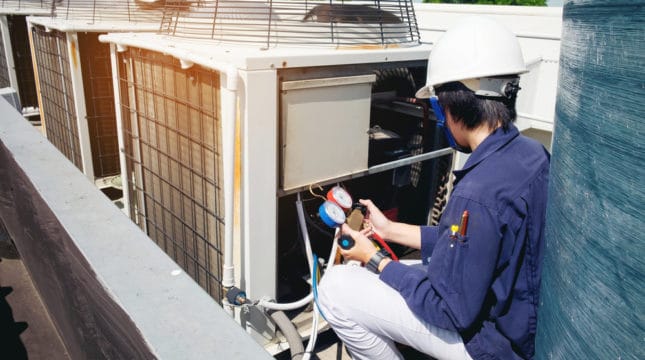Do you need a license to be an HVAC contractor?
Yes, you need a license to be an HVAC contractor in Arkansas. The Department of Labor and Licensing, through the HVAC Licensing Board, oversees the licensing process and issues licenses.
The state of Arkansas keeps things simple for HVAC professionals; there is only one license: an HVAC-R contractor license. However, there are several classifications within the license for you to choose from:
- Class A. Licensee may perform HVAC-R work without limitation to BTUH or horsepower capacities.
- Class B. Licensee may perform HVAC-R work on air conditioning systems with no more than 15 tons of cooling capacity.
- Class C. Licensee — who is in the business of servicing and repairing heating, ventilation, air conditioning or refrigeration equipment for the public — may repair or replace components of HVAC-R equipment and perform HVAC-R work on air conditioning systems. They may not install any original HVAC-R equipment or replace any existing HVAC-R equipment.
- Class D. Licensee may perform sheet metal work related to ductwork for HVAC-R systems.
- Class E. Licensee may perform refrigeration work without horsepower limitations.
- Class L. A “lifetime” license to perform HVACR service and maintenance work. They may not install new equipment. (For applicants over 65 years of age.)
If you take on jobs worth more than $50,000, you may need a Commercial Contractor license from the Arkansas Contractors Licensing Board. This license has much more extensive requirements, including a surety bond and providing a financial statement.
Earn your EPA Section 608 certification
The Environmental Protection Agency (EPA) mandates all HVAC-R professionals who service refrigeration systems must obtain EPA certification. HVAC technicians in Colorado must pass an exam with a minimum score of 70% and pay an exam fee of $120.
If you do any of the following activities, you’ll need to pursue EPA certification:
- Measure pressure within a refrigeration appliance by attaching and detaching hoses and gauges
- Add refrigerant to an appliance or remove refrigerant
- Perform any other action that violates the integrity of a motor vehicle cooling system or other small appliance
Insurance requirements for an Arkansas HVAC license
If you do business as a licensed contractor, you’ll need various types of HVAC insurance to fulfill state and licensing requirements. Other types of Arkansas business insurance are smart for any HVAC business owner to reduce their risk of financial losses.
Workers’ Compensation insurance
If you have employees, you must provide workers’ compensation insurance. If you or one of your HVAC technicians gets hurt on the job, this insurance can help provide wage protection and pay for medical expenses and other benefits.
Learn more about workers’ compensation for contractors.
General liability insurance
General liability insurance can help provide coverage if someone other than an employee claims that your company’s actions caused them injury or property damage.
As of 2022, class A, B, C, D and E license holders must now submit proof of a current general liability policy showing they have a minimum coverage of $250,000.
Learn more about general liability insurance for contractors.
Commercial Property insurance
Whether you own or rent your workspace, commercial property insurance is vital coverage for your business property. It also helps cover equipment, inventory and furniture related to your HVAC business.
Business Owner’s Policy
A business owner’s policy, or BOP insurance, provides broad coverage of general liability and commercial property policies combined in a single, cost-efficient bundle. It can help cover damage that you or your employees may accidentally cause to another person’s property and help protect your business equipment in the event of a fire or other covered event.
Tools and Equipment insurance
Tools and equipment insurance can help protect your gear. It covers the replacement, theft, and damage of tools and equipment.
Commercial Auto insurance
Arkansas mandates all drivers to carry auto insurance. Commercial auto insurance covers accident-related costs when you drive for work. This includes repairs and towing.
In the state of Arkansas, coverage minimums are:
- $25,000 of bodily injury per person or $50,000 per accident.
- $25,000 of injury to or destruction of property per accident.
How to get an HVAC license in Arkansas
Getting into the HVAC industry doesn’t require a formal apprenticeship, education or even legal requirements like a background check. You only need the federal EPA certification if you work with refrigerants.
Register as an HVAC-R professional
If you’re working as an HVACR technician or gaining experience, you must register with the State Board. The only requirements are:
Get an HVAC-R contractor license
There are several requirements and steps to getting your HVACR license in Arkansas. They include the following:
- Must be 18 years or older.
- Have at least two years of experience
- Have no disciplinary actions against a previous exam.
- Pay a $200 license fee.
- Pass an exam.
- Complete an application.
- Show proof of insurance — workers comp if you have employees
- You must also have proof of bond.
The two years of experience can vary. The Board will review the experience provided — educational training, work experience, etc. — and make recommendations for sitting the exam. You cannot sit for the exam without prior approval.
Prov proctors the HVAC licensing exam for all license classes. The number of questions and subject matter will vary depending on license classification, but all tests are open-book and timed. To pass the exam, you must score at least 70%.
Arkansas license renewal requirements
HVAC-R licenses expire annually, one year from when the license was issued. To qualify for renewal, you must complete at least four hours of continuing education and submit proof of current general liability and workers’ comp (if applicable).
License reciprocity for Arkansas HVAC contractors
Arkansas has no reciprocity agreements with other states for HVAC contractors. However, the Board will review your experience individually and determine exemption from testing.






